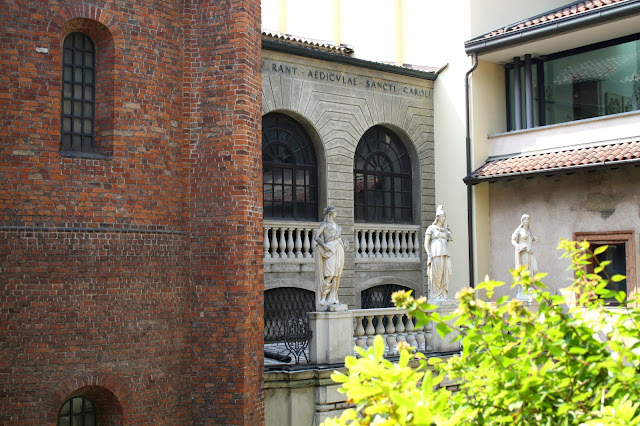"...o północy w Rzymie..." - Lord Byron w Koloseum / "...in the Midnight of Rome..." - Lord Byron in the Colosseum
Byron spędził w Rzymie trzy wiosenne tygodnie 1817 roku (tutaj opis tej wizyty). W tym czasie udało mu się zrobić coś zupełnie niewyobrażalnego w dzisiejszych realiach, a mianowicie spędzić noc w Koloseum i co najważniejsze w samotności. To na pewno zupełnie innego rodzaju doświadczenie niż przedzieranie się przez tłum turystów w spiekocie włoskiego słońca.
Jest coś niesamowitego w nocnym poznawaniu miasta. Cisza przerywana jedynie
echem własnych kroków, butelka wina wypita z przyjaciółmi pod Koloseum,
siedzenie przed fontanną di Trevi o 4 nad ranem jedynie w towarzystwie Carabinieri
pilnujących, by nikomu nie przyszło do głowy naśladowanie Sylvii i Marcella.
Przecież jestem Sylwią… (?!) To wszystko daje dziwne poczucie swojskości
i panowania nad rzeczywistością.
Byron spent
three spring weeks of 1817
in Rome (you can read about it here)
There is something extraordinary about exploring a city at nighttime. Silence interrupted only by the echo of your own footsteps, drinking the wine with friends next to the Colosseum, seating in front of the Trevi fountain at 4am only in the company of Carabinieri, who are making sure no one could think of imitating Sylvia and Marcello. After all, I am Sylwia… (!?)
It all gives such a strange sensation of familiarity and even more odd sense of being in control over reality.
Koloseum
O czym
myślał Byron? W ciszy przerywanej jedynie szczekaniem psów i pohukiwaniem
sowy, Byron analizował swoje życie i zdarzenia, które doprowadziły go tu, gdzie
jest teraz. Później, gdy dowie się o samobójstwie znienawidzonego adwokata Milbanke’ów,
który przyczynił się do jego społecznej zagłady, napisze do swojej byłej żony Anabelli:
„Może przed swoim
unicestwieniem, poczuł choć cząstkę tego, jak ja poczułem się przez jego
kruczki prawne, ale przeżyłem – przeżyłem, żeby zobaczyć go jako sześćdziesięcioletniego
samobójcę. Nie na darmo przywoływałem Nemezis o północy w Rzymie spośród jego najokropniejszych
ruin”.
What was
Byron thinking of? In the silence, interrupted only by the barking of dogs
and owls hooting, Byron was analyzing his life and events that had led him to
the place where he was now. Later, when he finds out about the suicide of the
hated Milbanke's lawyer, he will write to his ex-wife, Anabelle:
“Perhaps
previous to his Annihilation – he felt a portion of what he contributed his
legal mite to make me feel, but I have lived – lived to see him a Sexagenary
Suicide. It was not in vain that I invoked Nemesis in the Midnight of Rome from
the awfullest of her Ruins”.
Luigi Rossi, View of the Colosseum, etching, 1817
Samotna noc w Koloseum niezwykle silnie pobudziła wyobraźnię poety. Jej reminiscencje można odnaleźć m. in. w „Manfredzie” i „Wędrówkach Childe Harolda”:
Ach, przypominam, jako raz, za młodu,
Wędrowcem jeszcze, o podobnej nocy,
Podobnej ciszy, stałem w Koloseum
Wśród wielkich ruin potężnego Rzymu.
Drzewa rosnące wzdłuż rozpadłych łuków
Nurzały krańce w błękitnej północy.
Gwiazdy świeciły przez szczeliny gruzów,
A poza Tybrem brzmiało psów szczekanie,
Niedaleko mnie z pałacu cezarów
Odzywał się krzyk sowy, a z daleka
Dochodziła mię wesoła piosenka
Wart, aż ją wreszcie lekki wiatr rozproszył,
Cyprysy wkoło na zwaliskach grodów,
Zbutwiałych z czasem, wieńczyły horyzont,
Na strzał odległe. Gdzie dawniej cezary,
Tam dzisiaj nieme puszczyki mieszkają,
Na wpół przegniłych ozdobach gaj rośnie
I mknie korzenie w siedzibę cezarów;
Bluszcz się dobija o lauru pierwszeństwo.
Owdzie cyrk krwawy gladiatorów stoi,
Wspaniały szczątek, w gruzach doskonały;
Kiedy tymczasem komnaty Cezara,
Sale Augusta pełzają po ziemi.
Ty oświecałeś to wszystko, księżycu,
I rozlewałeś swój łagodny promień,
Który ugłaskał dzikość moich myśli
I próżnię wieków na nowo wypełnił.
Co było pięknym, jest i w resztce pięknym,
A co nie było, nabiera pięknoty,
Kiedy przeszłością uświęcone miejsce
Obudza w sercu cześć dawnej wielkości
I zmarłych władców popioły z urn jeszcze
Zdają się naszym rozkazywać duchom.
Taka to była noc! Dziwna!
Manfred, tłum. J. Kasprowicz, J. Paszkowski
„Dopóki Kolosseum będzie stało,
I Rzym stać będzie; a gdy runie ono,
Rzymowi także runąć przeznaczono,
A z Rzymem światu". Takie obiegało
Między naszymi pielgrzymami zdanie
O tych tu murach, gdy patrzyli na nie,
Niegdyś, w saxońskich czasach: dawne dzieje,
Starożytnemi u nas nazywane.
Wszystko to troje po dziś dzień istnieje:
I Kolosseum stoi niezachwiane,
I Rzym, i świat się nie rozleciał przecie, —
Ta nora łotrów, — lub zresztą co chcecie.
Wędrówki Childe Harolda, tłum. J. Kasprowicz
A lonely night at the Colosseum has strongly influenced the poet's imagination. Its reminiscences can be found, among others in “Manfred” and “Childe Harold’s Pilgrimage”:
I do
remember me, that in my youth,
When I was wandering,—upon such a night
I stood within the Coliseum’s wall
Midst the chief relics of almightyRome
The trees which grew along the broken arches
Waved dark in the blue midnight, and the stars
Shone through the rents of ruin; from afar
The watch-dog bay’d beyond the Tiber; and
When I was wandering,—upon such a night
I stood within the Coliseum’s wall
Midst the chief relics of almighty
The trees which grew along the broken arches
Waved dark in the blue midnight, and the stars
Shone through the rents of ruin; from afar
The watch-dog bay’d beyond the Tiber; and
More near
from out the Cæsars’ palace came
The owl’s
long cry, and, interruptedly,
Of distant sentinels the fitful song
Begun and died upon the gentle wind.
Some cypresses beyond the time—worn breach
Appear’d to skirt the horizon, yet they stood
Within a bowshot. Where the Cæsars dwelt,
Of distant sentinels the fitful song
Begun and died upon the gentle wind.
Some cypresses beyond the time—worn breach
Appear’d to skirt the horizon, yet they stood
Within a bowshot. Where the Cæsars dwelt,
And dwell
the tuneless birds of night, amidst
A grove which springs through levell’d battlements
And twines its roots with the imperial hearths,
Ivy usurps the laurel’s place of growth;—
But the gladiators’ bloody Circus stands,
A noble wreck in ruinous perfection!
A grove which springs through levell’d battlements
And twines its roots with the imperial hearths,
Ivy usurps the laurel’s place of growth;—
But the gladiators’ bloody Circus stands,
A noble wreck in ruinous perfection!
While
Cæsar’s chambers and the Augustan halls
Grovel on earth in indistinct decay.
And thou didst shine, thou rolling moon, upon
All this, and cast a wide and tender light,
Which soften’d down the hoar austerity
Of rugged desolation, and fill’d up,
Grovel on earth in indistinct decay.
And thou didst shine, thou rolling moon, upon
All this, and cast a wide and tender light,
Which soften’d down the hoar austerity
Of rugged desolation, and fill’d up,
As ’twere
anew, the gaps of centuries;
Leaving that beautiful which still was so,
And making that which was not, till the place
Became religion, and the heart ran o’er
With silent worship of the great of old,—
The dead, but sceptred sovereigns, who still rule
Our spirits from their urns.—
Leaving that beautiful which still was so,
And making that which was not, till the place
Became religion, and the heart ran o’er
With silent worship of the great of old,—
The dead, but sceptred sovereigns, who still rule
Our spirits from their urns.—
'T was such
a night!
Manfred
“While stands the Coliseum, Rome shall stand;
When falls the Coliseum, Rome shall fall;
And when Rome falls—the World.” From our own land
Thus spake the pilgrims o’er this mighty wall
In Saxon times, which we are wont to call
Ancient; and these three mortal things are still
On their foundations, and unaltered all;
Rome and her Ruin past Redemption’s skill,
The World, the same wide den—of thieves, or what ye will.
Childe Harold’s Pilgrimage
 |
Lord Byron contemplating the Colosseum in Rome by Arthur Willmore or James Tibbets Willmore |






Komentarze
Prześlij komentarz